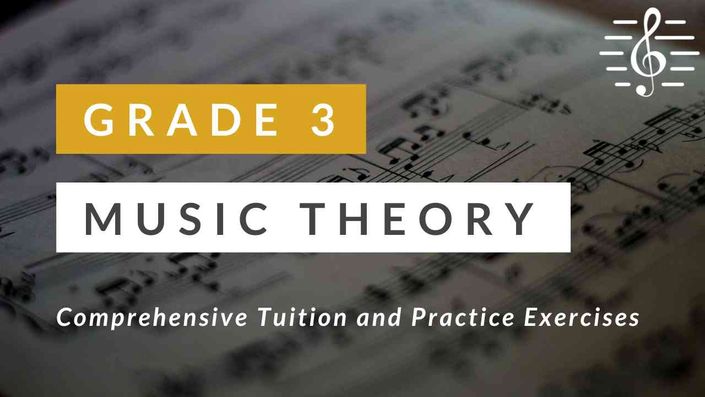
Grade 3 Music Theory
A complete, step by step and practical way to learn music theory and discover how music really works.
Enroll in Course
What You Will Learn
Become fluent in the fundamentals of music theory with the Grade 3 Music Theory course.
It's our belief that every musician needs to have the theory knowledge that supports their playing, singing, or composing skills. Designed to follow on directly from our Grade 2 Music Theory course, this course features clear explanations of music notation, many worked examples and practice exercises, definitions of important words and concepts, specimen questions and many helpful tips for students. As well as being suitable for candidates preparing for ABRSM music theory exams, this course also provides an excellent resource for anyone wishing to develop general music literacy skills. During the Grade 3 Music Theory course we'll cover...
- Simple and Compound Time - What is simple time and compound time? How do you tell the difference between them? How do you convert between Simple and Compound time?
- Demisemiquavers - What is a demisemiquaver? How long does a demisemiquaver last? What are the rules for beaming?
- Octave Transposition - How do you transpose music up or down an octave? How do you convert notation between clefs? Which clef is best to use?
- Phrase Structure - What is a phrase of music? How do phrases help you write music? How do you spot the phrase structure in a piece of music?
- Chords, Keys and Intervals - What's the difference between a perfect, major and a minor interval? How do you identify the key of a piece of music? How do you work out the notes of a particular scale or chord?
I cannot express how much you have helped me. I used to think that learning theory was a waste of time and would focus mostly on building up my technique. But not anymore (thanks to your epic explanations). The theory I've learnt from you has helped me bring another layer of depth to my violin, piano and guitar playing and even try my hand at composing. Most people who try teaching (anything really) just show off and try to convince everyone of how good they are in their chosen profession. But you never do that. You are humble and a delight to watch. THANK YOU so very much for what you do. My kindest regards to you, my dear sir.
- Thesath

Who Is This Course For?
All keen music students, performers and examination candidates.
Can you think of any other human endeavour where not knowing what you're doing is considered a positive? Understanding music theory is of great importance to all musicians. Music is a universal language and knowing how it all works is the key to improving. Our music theory courses cover all the essential elements of music from the ground up and are ideal for students preparing for examinations, as well as an excellent resource for anyone learning to read music. This course follows on from our Grade 2 Music Theory course.
Do any of these sound familiar?
"I really want to improve my music theory skills..." "I need help applying theory in terms of sound..." "I'm learning an instrument and I want to know more about the pieces I'm playing…" "I need to pass theory exams in order to access the higher practical grades..." "I'd like to try writing my own music and want to start learning how to approach that…"
↓
Fabulous as always. This is without a doubt one of the best music education sources on the net. Well done and thank you, Gareth!
- Patrick

By the end of the Grade 3 Music Theory course you'll be able to…

Easily determine simple phrase structures within a piece

Understand simple and compound time with great clarity

Write scales with up to four sharps or flats in the key signature

Transpose music up or down an octave with ease

Calculate more complicated intervals and chords

Work with demisemiquavers rhythms and notes on multiple ledger lines
I have learnt so much from you! So comprehensive, I truly appreciate your instructions. I’m an adult beginner pianist and your theory instruction has given me such a boost!
- Bronwyn

Course Information
What's Included with the Grade 3 Music Theory Course?
Professional Teaching
You'll receive expert tuition, making it easy to follow, digest and internalise all the important concepts of music theory.
Practice Exercises
The course contains a complete set of sample questions for you to test your knowledge after working through the teaching material.
Ask Questions
Below each video you are able to post comments and ask questions should you have any in regards to the course topics covered.
Easy to Follow Structure
The course is divided into multiple stages, breaking down each part separately before putting it all together.
Complete at Your Own Pace
You can easily fit the course around your regular commitments, completing it at your own pace and in your own time.
Anywhere Access
Your course never expires. Learn when and where you choose! Computer or mobile. Just get comfortable and dive in!
↓
Your Instructor

Hi, I’m Gareth and I'm passionate about developing ‘the all round musician’.
Over 35 years of music examining with ABRSM, work with the BBC on Radio and TV, experience on the international concert platform, as a published composer and arranger, have brought rich resources to the 40 years of teaching in which I've engaged.
Scholarships at The Royal College of Music, Oxford University and St. Paul’s Cathedral gave me fantastic opportunities to learn from the best musicians, scholars and teachers. Working as Director of Music at Queen Elizabeth Grammar School then provided a wonderful opportunity to develop my teaching skills.
Teaching individuals and groups of all ages, and at all stages of development have refined a teaching approach that I hope is fun and engaging, and focused on explaining things clearly and logically. And that is what these courses are all about - understanding the basic principles with clarity, then going deeper, applying them to your musical life and liberating yourself as a musician.
It’s a rich and amazing journey, and I can’t wait for you to join me today!
Course Curriculum
-
PreviewLesson 1 - Simple & Compound Time (25:38)
-
StartLesson 2 - Converting Simple & Compound Time (14:53)
-
StartLesson 3 - Demisemiquavers (8:11)
-
StartLesson 4 - Ledger Lines & Conversion (19:21)
-
StartLesson 5 - Octave Transposition (15:33)
-
StartLesson 6 - Writing Scales with Four Sharps & Flats (24:49)
-
StartLesson 7 - Tonic Triads (15:21)
-
StartLesson 8 - Identifying Keys (24:10)
-
StartLesson 9 - Beaming in Compound Time (23:38)
-
StartLesson 10 - Writing Four Bar Rhythms (7:42)
-
StartLesson 11 - Intervals (12:11)
-
StartLesson 12 - Simple Phrase Structure (19:52)
Frequently Asked Questions
A Letter from Gareth Green
MA (Oxon), MA (Leeds), FRCO(CHM), FLCM, ARCM
Many students of music want or need to pass music theory exams and this course is very focused on enabling you to achieve that.
At the same time, theory is about much more than passing exams. Have you ever wondered what it would be like to get inside the mind of a composer? Think of a piece that you’re working on or listening to at the moment. What inspired the composer to write it? When did the composer live and what are the features of musical style at that time? Then what did the composer need to think about in order to compose the piece?
Theory explores the ingredients that bring music to life and, contrary to the idea held by some that theory kills creativity, it’s theory that enables musicians to make sense of their musical ideas.
If we go back in time music was in the world well before anyone dreamt up music theory. So do we really need theory? After all, we can all enjoy music without needing to understand the nuts and bolts. Some musicians have the ability to perform and improvise without completely understanding the theory behind what they are doing. I can manage a few words and phrases in Italian but because I understand more grammar and vocabulary in French I get on much more successfully in French than I do in Italian. Because I understand even more grammar and vocabulary in my native tongue I get on considerably better in English than I do in French. The more we understand of a language, the more fluent we become, and music is often described as a language.
The interesting thing is that music theory was taken very seriously as far back as the time of the Ancient Greeks, who were keen to explain how music worked and to establish why certain approaches were more successful than others. Ever since, theory has continuously evolved to keep pace with explaining musical development.
Having taught music for over 40 years, my experience is that the more students understand theory, the more they understand and appreciate the music they perform, and the more excited, creative and engaged they become.
Don’t learn theory for the sake of learning theory. Engage with music as a listener, a performer, and/ or as a composer then grasp the theory that will equip you to reach your full potential as a musician. That’s what makes music theory so exciting! Enjoy!
— Gareth Green, Music Matters




